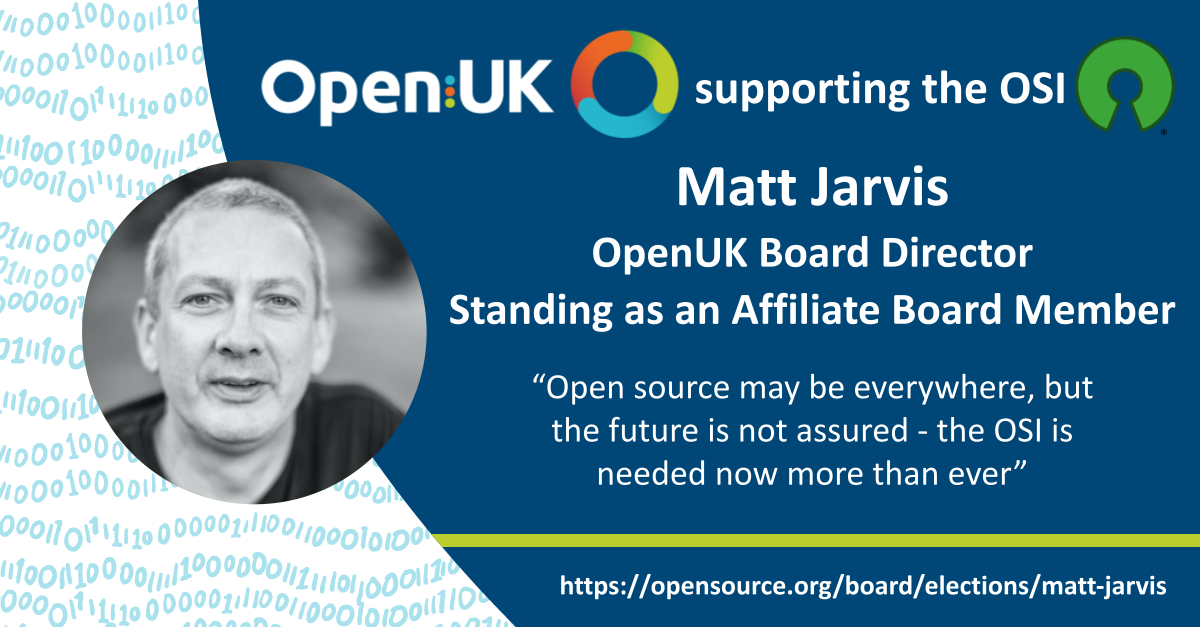This year I’m running as an affiliate candidate for the board of the Open Source Initiative, proposed by OpenUK

You can view my candidate proposal on the OSI’s website, which goes into some detail about why I would like to be considered and what I might bring to the role.
As has become somewhat of a ritual during the OSI elections, Luis Villa also posted a number of thought provoking questions on Twitter for all potential board candidates.
Now Luis is one of the smartest people I’ve met in the open source space, so things he says are generally worth listening to. I’ve put some thoughts below on his questions :
1st, a repeat from 2020 and 2021, possibly the existential question for the OSI board: “What should OSI do about the…millions of people who… collaborate to build software online (often calling that [collaboration] open source) but have…no idea what OSI is or what it does?”
I led with this in my candidate proposal, and it’s something which keeps me awake at night about the future of our movement.
I’ve seen this in my day job across thousands of enterprise end users of open source software over recent years - whilst folks are generally aware of licenses through corporate risk reduction, relatively few are aware of the OSI, the OSD or what it exists for.
That’s not to say that they don’t care, just that they haven’t been exposed to the ideas and the rationale.
The only way to counter this is for the OSI to educate people on the ‘why’ of the OSD and what the purpose and benefits of that are. Running programs like that at scale is not cost free however, so the second challenge is about funding and staffing the organization to enable that work.
2nd, also (sort of) a repeat: what should OSI’s relationship to the Organization for Ethical Source and Free Software Foundation (and their relevant movements) be?
The OSI’s relationship with other communities needs to be collaborative and collegiate so that the differences between them can be clearly expressed and understood.
Nothing is a zero sum game, and if folks want to license software under different terms, then clearly that is their prerogative.
However - enterprise users in particular rely on clarity, which is what the OSD and the OSI have given the market over the last 20 years, and ultimately that’s what has allowed not only for massive adoption, but also for massive growth in the amount of open source software and developers.
There’s nothing wrong in my opinion with having different kinds of licenses, but they aren’t open source as defined by the OSD, and cannot be without impacting on the mainstream of users.
3rd, what additive skills/perspectives do you bring to the board? This could be finance/money, ED/staff management, non-Valley/EU perspective… many options.
I’ve covered this somewhat in my candidate proposal, but I’ll re-iterate a bit here. I’ve been around open source for a long time, built an entire career out of it, and seen a lot of changes.
I’ve been a user, a developer, a contributor, a community builder, and these days I’m a professional advocate and educator, with real world experiences at both an executive and board level.
Most importantly in my view, I’m a pragmatist interested in achieving goals and outcomes. If organizations become talking shops, then they are not delivering anything of value to their stakeholders, so my bias is deeply towards action.
4th, OSI is in the process of shifting from a board-driven to a staff-driven org. How do you plan to support that transition in particular, and OSI’s staff more generally?
OpenUK has been through that transition in the last two years, and I’ve supported the executive and staff through that process. I’ve also had a diverse career in organizational leadership from startups to global enterprises, and I bring all those skills to bear in my pro-bono work as well.
5th, repeat from 2020: “You have 24 hours in the day and are talented enough to do many different things. Why do you want to give some of those hours to OSI?”
When I first started using Linux in the 1990’s I used to dream about finding a job where I could work with open source software every day, and I’ve been lucky enough to live that dream over a 20+ year career.
The biggest lesson I’ve drawn from those experiences is that our communities don’t work without folks chopping wood and carrying water, so I’ve always believed in stepping up and contributing wherever I can.
That’s all for now folks - I’d very much appreciate your consideration in my candidacy, and the opportunity to contribute to the future of an organisation I consider critical to the future of open source software.